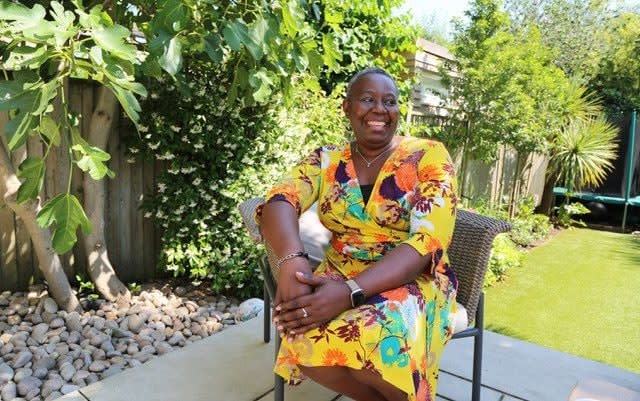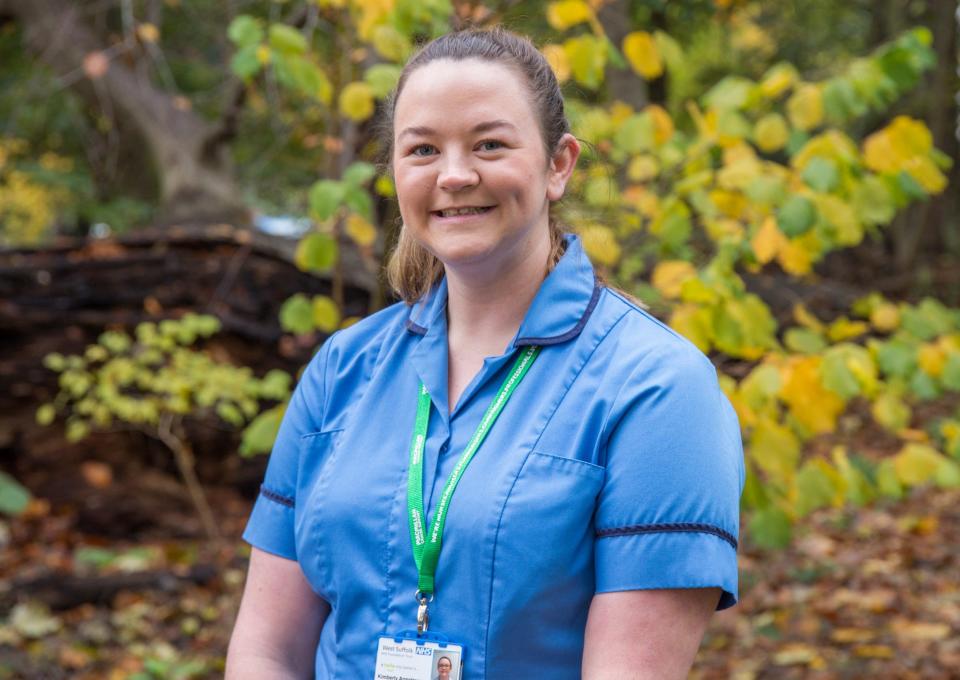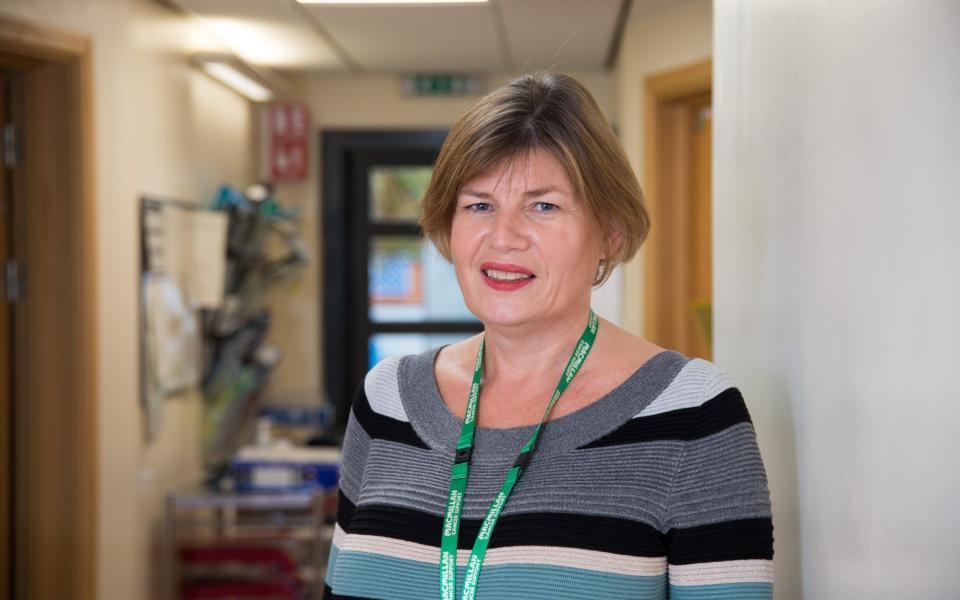‘My specialist cancer nurse still acts as my support system’

When Della Ogunleye was diagnosed with high grade ovarian cancer, her entire world turned on its head. Navigating the psychological impact on top of the practicalities of treatment seemed overwhelming - until her specialist cancer nurse stepped in. ‘Antonia helped me to understand different elements of my treatment,’ she says, ‘from helping me get a bed for my first consultation to checking I had all the paperwork needed for my blood tests before chemotherapy started.
‘When I was hospitalised for a few days before starting treatment, she ensured I was seen immediately for my tests rather than being in the queue whilst feeling unwell,’ continues Della, who is 59 and lives in London. ‘It was a relief knowing Antonia was going to be there for me during all the critical moments.’
Macmillan Cancer Support is the UK’s leading cancer support charity. Its nurses work in partnership with the NHS and are familiar with those critical moments. Funded by Macmillan throughout their specialist training and during their first three years in post, they work in the community, at hospices and in hospitals as Clinical Nurse Specialists. ‘Specialist cancer nurses are at the heart of cancer care across the UK,’ says Claire Taylor, Chief Nursing Officer at Macmillan Cancer Support. ‘They make a crucial difference to people living with cancer, providing tailored care and offering invaluable guidance throughout people’s diagnoses and treatments.’

However the UK’s cancer workforce is facing a crisis. Macmillan’s own research has identified ‘an exhausted, short-staffed cancer workforce’ dealing with an enormous backlog of patients whose treatments were delayed or disrupted during the pandemic. Across nursing as a whole, vacancies in the UK hit a record 46,828 this year according to NHS figures, with more than one in 10 roles currently unfilled. ‘NHS professionals go above and beyond for people living with cancer, but they are stretched too thinly and struggling under the strain of excessive workloads,’ says Claire Taylor. In cancer care, she adds, ‘The problem is set to get worse. By 2030, Macmillan estimates that almost 4,000 additional specialist cancer nurses will be needed across the UK to address the current shortfall.’
Karen McKinnon is a Lead Cancer Nurse at West Suffolk NHS Foundation Trust in Bury St Edmunds. ‘It’s a struggle to recruit at the moment,’ she admits. ‘A number of external factors, including the lack of new people coming into nursing, means making decisions for existing nurses to move into new roles can be difficult.’ Understandably, in times of economic hardship, staying in a familiar job often feels safer than moving to a new position or team. ‘And obviously, in the current climate, people are concerned about what’s in their back pocket,’ she adds.
Yet as cancer rates rise Macmillan’s frontline professionals are desperately needed to support patients and alleviate pressure on the NHS. ’Donations to Macmillan are more crucial than ever so we can continue to provide the vital support so many people with cancer rely on,’ says Claire Taylor. `We also need Governments across the UK to address the workforce crisis by taking urgent steps to grow and retain the number of healthcare professionals.’ They are calling for approximately £170million to train new Macmillan nurses and address the shortfall by 2030.
‘Nursing is undoubtedly hard work,’ Karen McKinnon says, ‘but it is also immensely rewarding and the pathway for career development and progression is so much better than it used to be. It’s not just the staff nurse you see on Holby City.’ Every day she sees the difference specialist cancer nurses make to the emotional wellbeing of patients.
‘There is a big fear element for cancer patients and their families,’ she says. ‘These nurses help to identify and discuss those fears, and explain the processes, which goes a long way to alleviate those fears.’
‘A patient’s world can implode when they receive a cancer diagnosis,’ agrees Kimberly Armstrong, a Urology Cancer Nurse Specialist also based at West Suffolk NHS Foundation Trust. ‘We make a huge difference, even if it’s in a seemingly small way like calling a patient back about a blood test, and talking them through it. We help to take those anxieties away. I’d spoken to a patient with prostate cancer several times on the phone, and when he was due to go for a test I said, “I’ll come with you. It’ll be good to put a face to the voice.” I sensed that made a big difference. It’s the patients who make this job for me.’

However, she admits that the pressures have ramped up since she qualified six years ago. ‘The sheer number of referrals is up by a huge amount - around a third - since the pandemic. A lot of days we don’t leave on time and it’s a challenge to be able to give everyone the attention they deserve. We never want people to feel rushed, or that we don’t have time for them. I do get emotional occasionally and shed the odd tear,’ she admits. ‘Luckily I have a very supportive team around me.’
Kimberly is adamant that more nurses are needed, ‘simply to get the work done. You spend an extra ten minutes on the phone to a patient because you sense they need that time to talk things through. But then you’re aware of all the other things piling up, waiting to be done. We need more feet on the ground and for the shoes to be filled of those nurses who are heading for retirement in the next few years.’ Kimberly was part of a Macmillan-funded Cancer Nurse Succession plan set up to address the fact that a large number of cancer nurses are due to retire within five to ten years, and how they will be replaced. The programme won a Macmillan excellence award.
‘Together with the patient, the specialist cancer nurse is at the very centre of what we do,’ Karen McKinnon adds. Having worked in nursing for over three decades she has seen enormous improvements in cancer treatment. Yet it is becoming ever more complex and potentially difficult to navigate, throwing up a raft of needs from the social and psychological to the managing of side effects.

‘With these changes, we have seen the specialist cancer nursing role becoming increasingly complex,’ she continues, ‘with Macmillan nurses requiring advanced knowledge and skills in clinical practice, as well as providing proactive case management, developing services, and offering leadership to the wider healthcare team.
‘Sometimes a patient is having as many as eight or nine lines of treatment. A Macmillan Navigator can help to support them through that,’ she says, adding that nowadays ‘so many more lives are saved and people are living for much longer with cancer. So it’s not unusual for us to keep a patient on our books for eight, nine or even ten years. We often have these great long-term relationships with our patients now.’
Three years after her ovarian cancer diagnosis, Della Ogunleye says, ‘I feel so sad to know that not everybody will get a specialist cancer nurse to support them like I had. Having Antonia’s support made all the difference in helping to navigate through the labyrinth of cancer treatment. To this day,’ she adds, ‘I have her telephone number and email and she acts as my support system when I need to speak to my oncologist. Without her, my treatment would have felt lonely, confusing and isolating. I’m grateful for her support every single day.’
Macmillan is one of four charities supported by this year's Telegraph Christmas Charity Appeal. The others are Age UK, RBLI and Action for Children.
To make a donation, please visit telegraph.co.uk/2022appeal or call 0151 284 1927

 Yahoo Movies
Yahoo Movies 
